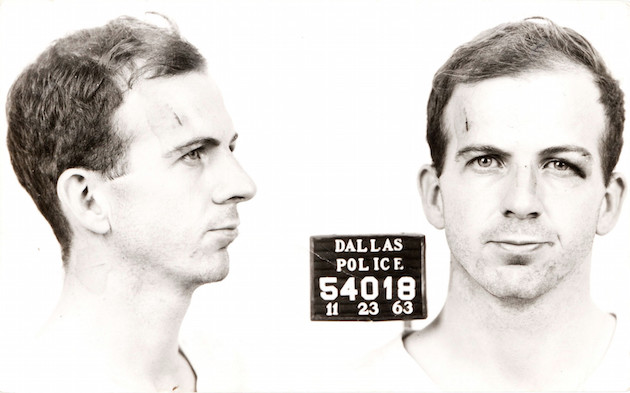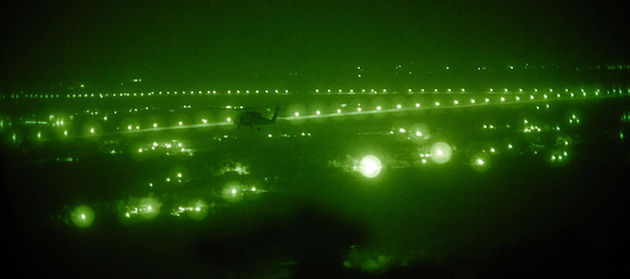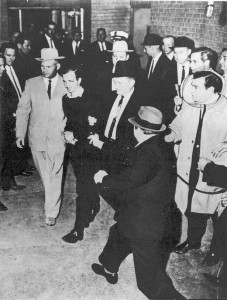
If the X-Files taught us anything, it’s that working with aliens or being a government whistleblower can be hazardous to your health.
The dead body of an “alien-hybrid” found in a parked SUV. A weapons scientist who predicted the circumstances of his own death. These stories are too outrageous for a reasonable person to take seriously. But in each case, there are tantalizing unanswered questions and a provable grain of truth—enough to stoke the imaginations of folks who are all too eager to believe the impossible.
Why do we find conspiracy stories so compelling? According to a study by University of Miami political scientists, a strikingly large number of us do, and those believers hail from all over the political spectrum: Around one-third of Americans believe that Obama faked his U.S. birth certificate; a similar number claim that the Bush administration was responsible for 9/11.
The University of Miami researchers define a conspiracy theory like this:
“(1) a group
(2) acting in secret
(3) to alter institutions, usurp power, hide truth, or gain utility
(4) at the expense of the common good.”
What unites so many of these conspiracy stories, the researchers point out, is a common thread of powerful forces operating in secret, to nefarious ends. Perhaps it’s our own anxiety that we’re helpless against such forces that fuels our willingness to believe stories like the ones below, no matter what the evidence may tell us.
An Unidentified Corpse in Pacific Palisades
In July, police found the badly decomposed body of a 60-year-old man in a parked SUV in Pacific Palisades, an upscale neighborhood in Los Angeles.
Let the oddities begin.
Initially, police investigators could not identify the man. Detectives finally IDed him as Jeffrey Alan Lash. They searched his house and the home of his fiancée, Catherine Nebron, and found a cache of guns worth more than half a million dollars, two tons of ammunition, $230,000 in cash, and several terrain-modified, combat-ready SUVs, including one outfitted to go underwater.
Lash had apparently died in a Santa Monica parking lot on July 4; Nebron had no idea what to do and decided to park the vehicle (with the body in it) on Palisades Blvd. and head to Oregon with a friend.
Family and neighbors of Lash, including his significant other of 17 years, had no idea what he did for a living. He told Nebron that he was a government agent and a half-alien tasked with saving mankind. She claimed that Lash told her that his handlers from an unnamed government agency would take care of his body.
[quote align=”center” color=”#999999″]How did a secretive guy with no apparent means of income amass millions of dollars in cash, souped-up vehicles, and weapons?[/quote]
No such handlers appeared. When she returned two weeks later and found his decomposing body still in the car, she called police.
Detectives dismissed Nebron’s government agent/alien tale and surmised that he was a loner survivalist or an extremely dedicated gun collector. But many unanswered questions remain: How did a secretive guy with no apparent means of income amass millions of dollars in cash, souped-up vehicles, and weapons?
No agency has come forward to claim that Lash was on the payroll. But then again, they wouldn’t, would they?
A Mysterious Suicide in an Oxfordshire Wood
Dr. David Kelly, a British scientist and expert on biological weapons, was found dead in an Oxfordshire forest in 2003, exactly as he had predicted. Kelly was of the Baha’i faith and felt compelled to keep his word. But keeping one’s word and working for the government don’t always go hand in hand.
He was on the team of researchers who searched for weapons of mass destruction in Iraq during the run-up to the 2003 invasion. He assured Iraqi officials that they wouldn’t have anything to worry about if they cooperated with UN weapons inspectors. He was wrong.

In an offhand, prescient remark to a British diplomat before the war, Kelly said that if the U.S. and U.K. invaded Iraq, he would most likely “be found dead in the woods.” An invasion, Kelly felt, would make him into a liar with his Iraqi associates and quite possibly get them killed. Shortly after the invasion, Kelly was, indeed, found dead in the woods of an apparent suicide.
Kelly’s death happened two days after he had been investigated for speaking to a BBC reporter. The BBC alleged that documents were “sexed up” to drum up support for the war; U.K. officials accused Kelly of leaking classified information to the BBC—information exposing flaws in the government’s report on the existence of WMD in Iraq.
The day Kelly’s body was found, Prime Minister Tony Blair asked Lord Hutton to investigate the circumstances of his death. Hutton never completed that inquest. The summary report concluded that Kelly was the single source of leaked information and that he committed suicide by ingesting painkillers and slicing his wrists. But oddly, Hutton initially asked that the results of the autopsy and toxicology tests be kept classified for 70 years, for the sake of Kelly’s family.
That report was eventually released, and it supported Hutton’s conclusions. But a group of doctors still harbors doubts about the cause of Kelly’s death. “No coroner in the land would have reached a suicide verdict on the evidence which Lord Hutton heard,” they said (via this BBC story), pointing out that no fingerprints were found on the gardening knife Kelly supposedly used to cut his wrists, and that his wounds did not seem to be life threatening. “The continuing cover-up of the truth of what happened is a national disgrace and should be of concern to all British citizens,” said Dr. Stephen Frost, who led the doctors’ group campaign to reopen the inquiry into Kelly’s death.
According to a pollster who spoke to The Guardian, the controversy over how Kelly died and public outrage about the government’s manipulation of the case for war in Iraq “are intertwined” and are “part of the continuum of declining trust.” And with Kelly’s death so highly politicized, it’s likely no one will ever agree on what really happened in that Oxfordshire wood.
The Conspiracy Theory Heard ‘Round the World
The mother of all conspiracy theories was born with the crack of a rifle on Nov. 22, 1963. “That day in Dallas changed the way we think about the world,” said novelist Don DeLillo in an interview with Frontline. “What’s at stake is our trust in a coherent reality.”
To explain our enduring fascination with the the many alternate histories people concoct to explain JKF’s assassination, DeLillo cites a litany of contradictory physical evidence, conflicting witness accounts, and Cold-War intrigue surrounding those events:
“There are the Soviet and Cuban themes, the organized crime theme, the double agent theme, and many others, all with their sets of supporting evidence. There are the official documents lost, missing, altered, classified and destroyed … A culture of distrust and paranoia began to develop, a sense of the secret manipulation of history, and this feeling intensified through the decades, from Dallas to Vietnam to Watergate to the doorstep of Iraq.”

The Warren Commission’s 888-page report concluded that Oswald fired the shots that killed Kennedy, and that explanation is the most likely one. But decades later, the report remains controversial, and promulgating wild theories about JFK’s death has become an industry in its own right.
“We’re trained to weigh evidence and look for the most rational, most plausible explanations of historical events,” explains investigative journalist Gerald Posner in an interview with Frontline.
“Yet … the idea that this individual, acting entirely on his own, gunned down President John F. Kennedy and changed the course of history, seems utterly irrational, even absurd. How do you respond to that sense of absurdity, the sense that the trail of evidence seems to lead us down the rabbit hole into an irrational world?”
Perhaps it’s the human craving to make sense of our irrational world that tempts us to embrace fantastical stories and reject more banal and absurd ones. Even scholars can’t agree on what happened that day in Dallas. “The truth is knowable,” adds DeLillo. “But probably not, ever, incontrovertible.”
About the Author:
Daniel Myrick is a freelance writer and observationist, former English teacher, and failed comedian. His interests include mindfulness, poverty, the environment and support for disenfranchised people worldwide. He is an ardent champion of terrestrial, freeform radio and a DJ at Radio Boise. You can follow him on Twitter @Myrick208.
Sources:
“Why Do People Believe in Conspiracy Theories?” by Michael Shermer (Scientific American)
“L.A. Dead Man Left in Car by Common-Law Wife Had 1,200 Guns, 14 Cars, $230,000 in Cash” by Ben Mathis-Lilley (Slate)
“Dead man with cache of 1,200 guns identified — ‘He was just a loner’” by Veronica Rocha and Richard Winton (L.A. Times)
“Kelly’s talk of death in the woods” (BBC News)
“Dr David Kelly: 10 years on, death of scientist remains unresolved for some” by Vikram Dodd (The Guardian)
“Oswald: Myth, Mystery and Meaning” (Frontline)
“Warren Commission” (History.com)

